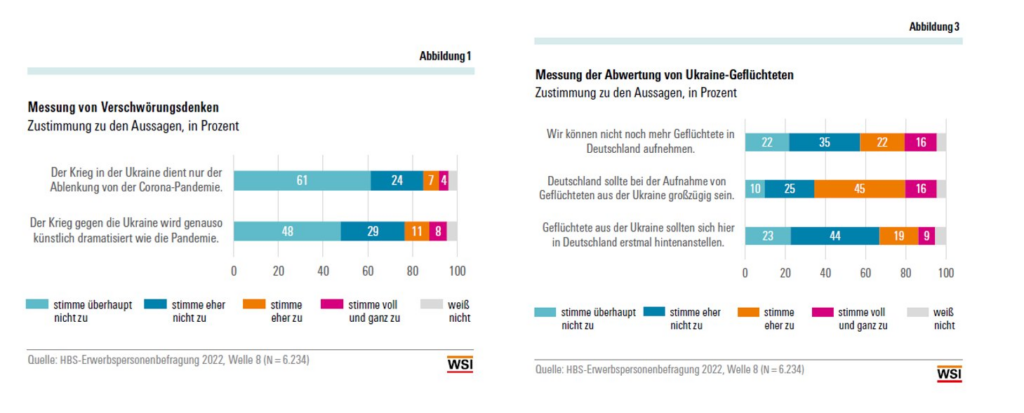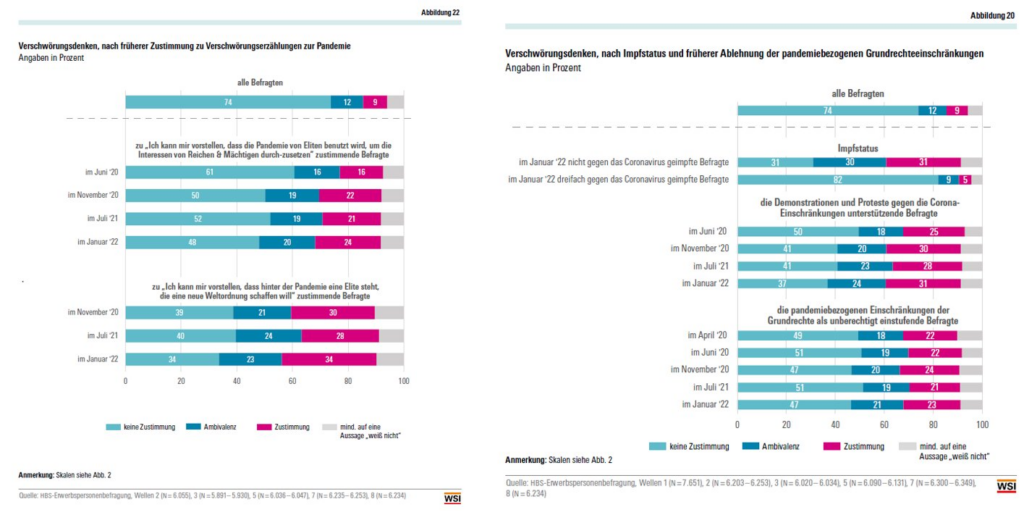Here are the five main findings:
1) While majority (74%) of the labor force in 🇩🇪 opposes conspiracy beliefs, ~10-20% agree to the statements. Prevalence of devaluations of Ukrainian Refugees in 🇩🇪 are not negligible and temper the picture of the sheerly positive German welcoming culture toward Ukrainians.

conspiracy beliefs:
11% agree to “the war in Ukraine only serves to distract from the pandemic”.
19% agree to “the war in Ukraine is exactly as dramatized as the pandemic”
devaluations toward Ukrainian Refugees:
38% agree to “we cannot receive even more Refugees in Germany”.
35% do not agree to “Germany should be generous when it comes to receiving Refugees from Ukraine”.
28% agree to “Ukrainian Refugees have to wait in line here in Germany”
2) Conspiracy beliefs appear as pretty open for right-wing content in Germany. Majority of those sharing conspiracy beliefs agree to devaluations of Ukrainian Refugees. Only 4% of respondents sharing conspiracy beliefs do *not* agree to the devaluations.

3) Agreement is higher among the disadvantaged labor force (low income, educational-level) – particularly among the young, (male) disadvantaged.* Experiences of powerlessness & alienation here relevant.
*latter should be interpreted with caution due to small sample sizes.

The respective bar at the top always displays the distribution among all respondents: 9% agree to conspiracy beliefs; 17% to devaluations. Below displayed are the distributions among specific socio-demographic characteristics: “jung” = young; “geringverdienend” = low income; “geringe Schulbildung” = low educational level;
Agreement among young & low educational level (“jung und geringe Schulbildung”): conspiracy beliefs 26%, devaluations 30%
4) Majority of those sharing conspiracy beliefs about the war in 🇺🇦 also shared pandemic-related conspiracy beliefs earlier. Shows how exchangeable & adaptable the content of conspiracies is. Also: here much more often uncooperative behaviors during pandemic (vax…)

31% of the unvaxxed respondents (in January ´22) agree now to the conspiracy beliefs about the Ukraine war. (9% among all respondents; 5% among “boostered” respondents).
22% of those respondents who assessed 2 years ago the protection measures against the virus as unjustified now agree to the conspiracy beliefs aout the Ukraine war. (all respondents: 9%)
5) financial and job worries, as well as political alienation – both recently much more widespread in Germany – are also highly relevant. In crises such as this one, insecurities and lack of trust are particularly potent.

agreement among respondents with worries about their career perspectives: conspiracy beliefs 18%, devaluations: 31% (all respondents: 9% and 17%)
These findings should raise awareness for the threat of further destabilization processes. It becomes obvious how compatible and attractive conspiracy beliefs can become and how quickly solidarity is revoked, when financial securities begin to sway.
The findings also show relatively small but in their attitudes highly solid clientele that has most widely turned its back on democratic discourses, with great distrust in societal institutions and that predominantly behaved uncooperatively during the pandemic.
Data: The data is from the @boeckler_de-labor-force-study, a panel-study that repeatedly surveyed 6.000-7.500 respondents (labor-force >16 years). The first survey took place in April ´20. Most of the findings presented here are from the latest 8th wave surveyed in Apr/May´22.
You can download the full German report here: